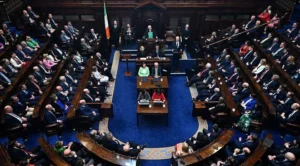 The last few years have been a long and turbulent period for the UK gambling industry, as far as fixed-odds betting terminals (FOBTs) are concerned. The saga has had its ups and downs, with some unexpected turns, fierce verbal battles between FOBT proponents and opponents, and even a ministerial resignation filed in the process.
The last few years have been a long and turbulent period for the UK gambling industry, as far as fixed-odds betting terminals (FOBTs) are concerned. The saga has had its ups and downs, with some unexpected turns, fierce verbal battles between FOBT proponents and opponents, and even a ministerial resignation filed in the process.
In November 2018, the UK Government finally announced a U-turn over the previously revealed delay to the FOBT crackdown, saying that the long-expected change in the machine’s maximum stakes would be brought forward as initially expected, in April 2019. The British lawmakers decided to finally stick to their first decision, after they faced a growing criticism and a ministerial rebellion following the announcement of an October 2019 crackdown.
Following the statement made by the Culture Secretary Jeremy Wright that the changes will be implemented in April next year, the cost of the decision has been estimated to approximately £100 million. As mentioned above, the Government’s decision was unveiled after weeks of disapproval from backbenchers and even facing a risk of losing a vote on the Budget. Despite things did not get to a Budget defeat, Tracey Crouch resigned from her position as Minister of Sports and Civil Society after being disappointed with the previously announced decision of the Government to delay the FOBT crackdown until October 2019.
Does the UK Government’s u-turn on the gambling crackdown worth it? Considering how long and problematic the whole process was, we would probably not be mistaken, if we say that it does, despite the negative effects which gambling operators claim as inevitable.
FOBTs Being Blamed for Causing Severe Gambling Addiction
 As Casino Guardian has already reported, the last few years saw increased criticism on the controversial fixed-odds betting machines. The terminals, which still offer local gamblers the chance to put a maximum bet of £100 every 20 seconds, have been blamed for their addictive nature and massive stakes which could end up with players theoretically losing up to £18,000 an hour.
As Casino Guardian has already reported, the last few years saw increased criticism on the controversial fixed-odds betting machines. The terminals, which still offer local gamblers the chance to put a maximum bet of £100 every 20 seconds, have been blamed for their addictive nature and massive stakes which could end up with players theoretically losing up to £18,000 an hour.
The FOBT have also been blamed for targeting the most vulnerable members of society, quickly turning their fascination to addiction thanks to their flashing lights and monotonous sounds which made them spend more time and money on the machines.
According to anti-gambling campaigners, the controversial machines have been extremely dangerous to UK players’ lives and well-being, as gambling-related harm also affects not only gamblers themselves but their friends and families, too. They have criticised local gambling operators which, according to FOBT opponents, had done nothing to promote responsible gambling and had even encouraged players to spend more time playing the fixed-odds betting machines. Anti-gambling campaigners have also called the UK Government to take stricter measure in order to tackle constantly spreading problem gambling rates in the country.
The Government has agreed that protecting vulnerable people from getting involved with FOBT gambling and suffer the negative impact of compulsive gambling should be prioritised. Still, it revealed that it also needs to take care of the ones employed by the gambling industry and provide operators with enough time to make a smooth transition to the new rules.
FOBT Review Was Delayed in 2017
 That was exactly the reason why the UK Government decided to roll out a review of the local gambling sector, and more specifically, on the fixed-odds betting machines.
That was exactly the reason why the UK Government decided to roll out a review of the local gambling sector, and more specifically, on the fixed-odds betting machines.
Just like the announcement of the gambling crackdown earlier in 2018, the announcement of the FOBT review results had not happened very smoothly. The Government delayed the announcement until October 2017, saying that it needed more time to process the information and make a final decision on the issue.
At the time of the review, it has been revealed that the amount lost by British players on FOBTs alone reached a record high of £1.8 billion, with more than 34,000 machines operating in the UK. The Department for Culture, Media and Sports (DCMS), which was conducting the review, faced a lot of criticism for the delay, and the Government was blamed for not being ready to give up from the annual tax revenue generated by FOBTs.
Of course, gambling operators did not agree with the accusations that the gambling terminals were highly addictive. Moreover, companies protested said they were against any maximum stake reductions, as such a step would severely hurt their performance.
FOBT Saga Finally Ends with Crackdown Deadline in April 2019
 Finally, the UK Government unveiled its decision for the fate of FOBTs’ maximum stake, saying it will be slashed from the current £100 to £2. The reduction of the maximum stake was initially set to happen in April 2019, but then, at the beginning of November 2018, UK Chancellor of the Exchequer, Philip Hammond, suddenly revealed that the implementation of the expected crackdown would be put off until October 2019.
Finally, the UK Government unveiled its decision for the fate of FOBTs’ maximum stake, saying it will be slashed from the current £100 to £2. The reduction of the maximum stake was initially set to happen in April 2019, but then, at the beginning of November 2018, UK Chancellor of the Exchequer, Philip Hammond, suddenly revealed that the implementation of the expected crackdown would be put off until October 2019.
As Casino Guardian has previously reported, the announcement was followed by a massive outrage of anti-gambling campaigners. Despite the fact that Chancellor Hammond explained that the delay was intended in order to compensate for the reduction of the FOBT maximum stake and to provide some more time for gambling operators to prepare for the changes which they would be expected to make in their businesses.
After the announcement for the delay was made, the Minister of Sports and Civil Society Tracey Crouch has resigned from her ministerial role, as she has been one of the most eager opponents of the fixed-odds betting terminals and the harmful effect they have on gambling addicts’ physical, mental and emotional state. Things, however, did not end there. The objections to the UK Government’s decision for the delay quickly rose to a political and public outrage, and a number of ministerial aides warned Prime Minister Theresa May they would resign if the decision for the FOBT crackdown’s implementation is not changed.
This worked. With the pressure of the Government rising immensely, UK lawmakers decided to move backwards from the delay and reconsidered FOBT crackdown. At the middle of November, Culture Secretary Jeremy Wright made a statement, revealing that the Government would finally stick to its initial decision to roll out the gambling crackdown at the end of April 2019.
- Author


